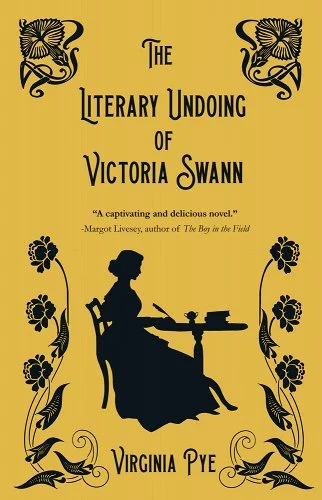
Regal House, 2023
How might a woman writer in Gilded-Age Boston break free from the authorial identity fashioned by her publisher and take control over not just her writing but her life?
Virginia Pye’s The Literary Undoing of Victoria Swann is, at its core, a novel that centralizes women’s creative labor. Born Victoria Meeks and re-christened by her editor as the enigmatic Mrs. Swann, Victoria churns out popular adventure and romance novels for her female readership and for a publishing firm that makes clear that the author is one of their cheapest and woefully under-compensated yet most “prolific and agreeable” assets. Despite her novels’ profitability, Victoria is discontented with what she feels to be the formulaic and disingenuous nature of her “exotic” narratives, which she calls “useless fantasies, pleasant confections spun like sugar.” By rejecting her publisher’s quantification of her work as “output” and insisting on writing from life, Victoria reclaims her agency in spite of the men in her personal and professional lives who find such a turn disagreeable and threaten to air her dirty laundry in hopes of keeping her in line. As she simultaneously manages the logistics of her artistic rebirth and a financially devastating divorce from a profligate husband, she proves herself to be far more than “a provincial woman blessed with a vivid imagination but little else.”
Through her turn towards realism, Victoria allows herself to interrogate the most gut-wrenching moments from her past, experiences that she knows will resonate with her New Women readers. Writing, then, becomes less a form of escapism than a means of navigating personal and familial trauma, including the death of her father following a carriage accident for which Victoria has long blamed herself. Writing under her own name, Victoria Meeks refuses to hold back, penning immediately controversial depictions of drug use, loss, and violation, not to mention a narrative about abortion in which she painstakingly weaves her own personal experience into both the “national conversation” about women’s lives and the “magnificent tapestry” of American literature. In doing so, she demonstrates her commitment to stories that resonate with everyday women who deserve “stories in which they are the true heroines” and mirror “their lives in the here and now.”
Victoria Meeks Swann may be the titular character, but the novel is a mosaic of the various others who play roles in her endeavors. In truth, Victoria is not the sole Mrs. Swann. Dottie Windsor, Victoria’s devoted assistant, for instance, undertakes much of the research required to write immersive novels, and she also handles much of the author’s public correspondence, writing a monthly advice column under the pen name in which she, as Mrs. Swann, responds strategically, if not sternly, to the “most intimate concerns” submitted by adoring young female fans. Through the inclusion of Dottie, Pye sheds light on the often-collaborative nature of the creative process. And though she mostly exists on the periphery, the lavish, celebrity singer Miss Pennypacker becomes a vehicle for Pye to ask whether artistic excellence translates to other domains. Initially Jonathan Cartwright, the young editor assigned to both the chanteuse and Victoria, dismisses Miss Pennypacker, for he simply “can’t imagine she writes well. She’s a singer after all.” The male publishers at Thames, Royall & Quincy cannot seem to fathom that the woman, a far cry from the Harvard-educated intellectuals who populate Cambridge and dictate literary taste, could write a narrative that matters to the public, much less write at all. Is it not enough that she renounced her pedigree in order to undergo an artistic metamorphosis and commit to creating on her own terms?
Enthusiasts of deeply contextualized historical novels may encounter some frustration with Pye’s surface-level jaunt through Boston society in the late nineteenth century. Many promising moments hint at critical women’s issues, ranging from healthcare to property rights; a slower pace, paired with a tighter plot, would likely provide the nuance that some readers are left craving. Nevertheless, for readers interested in texts that examine the working lives of creative women, there is certainly something inspiring about the protagonist’s persistence in the face of such adversity.
+++
Virginia Pye’s short story collection, Shelf Life of Happiness, won the 2019 IPPY Gold Medal for Short Fiction, and one of its stories was nominated for a Pushcart Prize. She is also the author of two award-winning, post-colonial historical novels, River of Dust and Dreams of the Red Phoenix. Her essays have appeared in The New York Times, Literary Hub, Publishers Weekly, Huffington Post, Cleveland Plain-Dealer, and Writer’s Digest, as well as in numerous literary magazines. A graduate of Wesleyan University, she holds an MFA from Sarah Lawrence College and has taught writing at New York University, the University of Pennsylvania, and, most recently, at GrubStreet’s Muse and Marketplace Conference in Boston. She is Co-Fiction Editor for Pangyrus, a literary journal based in Cambridge, and a board member of the Women’s National Book Association, Boston Chapter.
+
Gabrielle Stecher (Ph.D., University of Georgia) is a Lecturer and Associate Director of Undergraduate Teaching in the Department of English at Indiana University Bloomington. She writes about the stories we tell about women artists and actors, primarily from the nineteenth century to the present. Her portfolio is located at www.gabriellestecher.com.